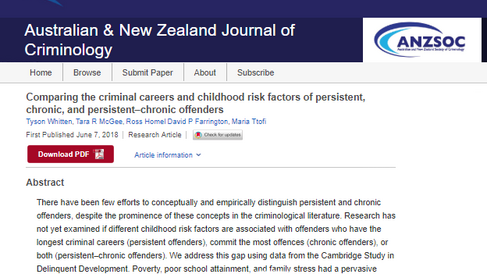
VRC member Dr Maria Ttofi has published a paper called Comparing the criminal careers and childhood risk factors of persistent, chronic, and persistent–chronic offenders in the Australian & New Zealand Journal of Criminology. Co-authors of this paper are Prof David Farrington, Institute of Criminology, University of Cambridge; Prof Tara R McGee, Griffith Criminology Institute, Griffith University; Prof Ross Homel, Griffith Criminology Institute, Griffith University and Dr Tyson Whitten, Griffith Criminology Institute, Griffith University.
Abstract
There have been few efforts to conceptually and empirically distinguish persistent and chronic offenders, despite the prominence of these concepts in the criminological literature. Research has not yet examined if different childhood risk factors are associated with offenders who have the longest criminal careers (persistent offenders), commit the most offences (chronic offenders), or both (persistent–chronic offenders). We address this gap using data from the Cambridge Study in Delinquent Development. Poverty, poor school attainment, and family stress had a pervasive impact on all forms of offending in correlational analyses. Longer criminal career durations were associated with fewer childhood risk factors than was the case for chronic offenders. Chronic offenders were significantly more likely than persistent offenders to experience many environmental risks in childhood. When controlling for all other risk factors, hyperactivity and parental separation uniquely predicted persistent offending, while high daring and large family size uniquely predicted chronic offending. Our analyses point to the need for responses based on a philosophy of “proportionate universalism,” where universal multisystemic crime prevention strategies that benefit all children incorporate program components that are known to influence the unique risk factors for both persistent and chronic offending.
You can find the paper here.
